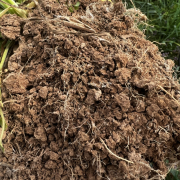Study Underscores Importance of Soil Health and Identifies Greatest Threats
A major review of agricultural practices conducted by Rothamsted Research and published in NPJ Sustainable Agriculture has concluded that while intensive techniques such as plowing, fertilizer use, and irrigation can boost crop yields in the short term, their regular longer-term use can degrade soils, leaving them less able to withstand shocks such as drought, flooding, or geopolitical disruption. This study also ranked the greatest threats to soil resilience, topped by elevated erosion caused by over-plowing, and including overgrazing and deforestation, salinization of irrigated farmland, contamination from pesticides and plastic residues, and compaction from intensive livestock farming. The authors warn that ignoring soil resilience could leave farming systems increasingly vulnerable to tipping points, where sudden collapse of productivity becomes irreversible. “Breaking the cycle of soil degradation is possible,” lead author Dr. Alison Carswell concludes, “but it requires rethinking how we manage land – not just for yields next season, but for resilience in the decades to come.”
Related ATTRA publication: Saline and Sodic Soils: Identification, Mitigation, and Management Considerations



 Dhanush Udayashankara Jamadgni, NC State University
Dhanush Udayashankara Jamadgni, NC State University